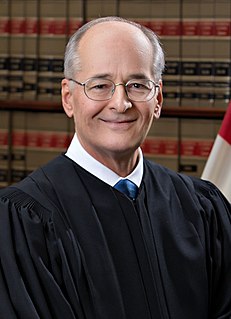A Quote by W. Somerset Maugham
There was once a professor of law who said to his students. When you are fighting a case, if you have facts on your side hammer them into the jury, and if you have the law on your side hammer it into the judge. But if you have neither the facts nor the law, asked one of his listeners? Then hammer the hell into the table, answered the professor.
Related Quotes
Personally, I think government is a tool, like a hammer. You can use a hammer to build or you can use a hammer to destroy; there is nothing intrinsically good or evil about the hammer itself. It is the purposes to which it is put and the skill with which it is used that determine whether the hammer's work is good or bad.
I'm a common law judge. I believe in deciding every case on its facts, not on a legal philosophy. And I believe in deciding each case in the most limited way possible, because common law judges have a firm belief that the best development of the law is the one that lets society show you the next step, and that next step is in the new facts that each case presents.
Yet, when these facts are seen side by side with other facts in the case, it is difficult not to become lost in superstitious awe. Their very absurdity seems to prohibit the use of the words 'chance' and 'coincidence.' For the sceptic there remains only one consolation: if there should be such a thing as superhuman Law, it is administered with sub-human inefficiency.
Jurors have found, again and again, and at critical moments, according to what is their sense of the rational and just. If their sense of justice has gone one way, and the case another, they have found "against the evidence," ... the English common law rests upon a bargain between the Law and the people: The jury box is where the people come into the court: The judge watches them and the people watch back. A jury is the place where the bargain is struck. The jury attends in judgment, not only upon the accused, but also upon the justice and the humanity of the Law.
Friend, my enemy, I call you out. You, you, you there with a bad thorn in your side. You there, my friend, with a winning air. Who pawned the lie on me when he looked brassly at my shyest secret. With my whole heart under your hammer. That though I loved him for his faults as much as for his good. My friend were an enemy upon stilts with his head in a cunning cloud. -Dylan Thomas





































